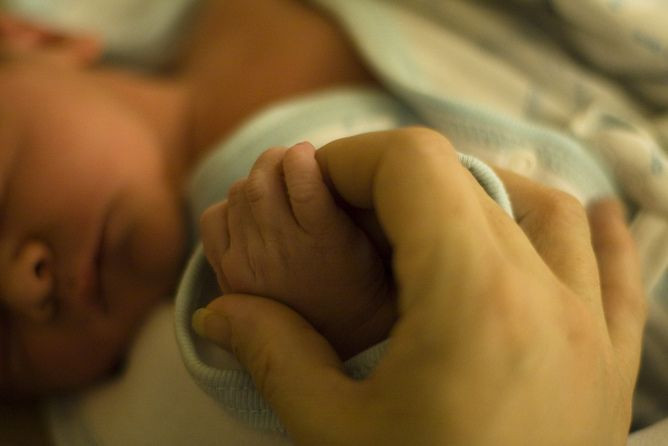Mothers Choosing At-Home Birth Risk Severe Complications, Higher Likelihood Of Death

For most women, pregnancy and giving birth are a magical time in. But that doesn't mean the process is without its fears and anxieties. Often, a doctor will give a woman the option of delivering in her own home, to make the process less traumatic.
However, this may soon stop, as a new study of 146,752 women in the Netherlands with low-risk pregnancies has shown that there can be severe adverse effects to both mother and child is a delivery occurs at home, instead of in a hospital. Twp out of every 1000 women died while giving birth at home, and 55 percent of the home birth women experienced a hemorrhage, or dangerous amount of lost blood.
There is a 26 percent risk reduction if a woman gives birth in a hospital. This is likely because if emergency treatment is necessary, like a caesarian section or the need to put a child on neonatal assistance, as well as routine procedures, like removal of the placenta or ensuring the woman is not losing too much blood, the hospital can immediately provide that care. If things go wrong during a home birth, emergency assistance must be sought at a hospital, not by the one or two midwives that may assist a woman at home. Time spent getting to a hospital could be the difference of life and death for either the newborn or new mother.
While 288 women in the study died during a home birth, only 141 women died during a hospital birth. This is nearly half as many incidences of something doing awry. The availability of rapid care is highly important, especially given that there are two lives involved.
However, women given the choice to give birth at home will often choose to do so. Forums on WhatToExpect.com, a leading network for information regarding pregnancy and parenting, indicate that women like the idea of being at home, without machinery, needles, drugs and general hospital sounds as they give birth. In a recent thread, women warn a user to consider carefully the care she will be without if she gives birth at home. One user, souse-wright, says, "Home birth can be a beautiful experience but unforeseen things can go wrong. Are you willing to take that risk? I worked in a labor and delivery unit at a specialty hospital. Women can hemorrhage and lose lots of blood and need a transfusion. There are babies who got pneumonia from inhaling the water after they come out of the birth canal."
Meanwhile, another user, JoJoMommy2010 reassures, "I had a home birth — while I hated the pain, the comfort and ease of being at home is unbeatable. And I didn't have the excruciating experience of riding in a car while contracting! Here is what I would say — is the birth center going to offer something your home doesn't? If it is attached to a hospital, then that is nice — close access to emergency medical care. But if not, then they won't have anything different than what the midwife will bring to your home."
Women are well informed about the pros and cons of hospitals, and while it is, in the end, a personal choice, the study indicates that risks of at-home delivery still exist.
The researchers also noted that their results may be based on the region in which they performed their study. Eighty two percent of women were 45 minutes away from the hospital, with the average time to the hospital being 35 minutes. The study states that travel time is of importance for the safety of births, with a higher incidence of adverse outcomes occurring when a mother was 20 minutes or more away from the hospital.
While the other women who had home births in the study had successful experiences, it is important to note that emergencies can happen unexpectedly and availability of emergency care is a must while giving birth. Women with low risk pregnancies do not have increased risk of adverse occurrences if they choose a home birth, but home births can become very dangerous if emergency care and personnel are not available.
Source: de Jonge A, Mesman JAJM, Mannien J, Zqart JJ, van Dillen J, van Roosmalen J. Severe adverse maternal outcomes among low riskwomen with planned home versus hospital births inthe Netherlands: nationwide cohort study. BMJ. 2013.
Published by Medicaldaily.com



























